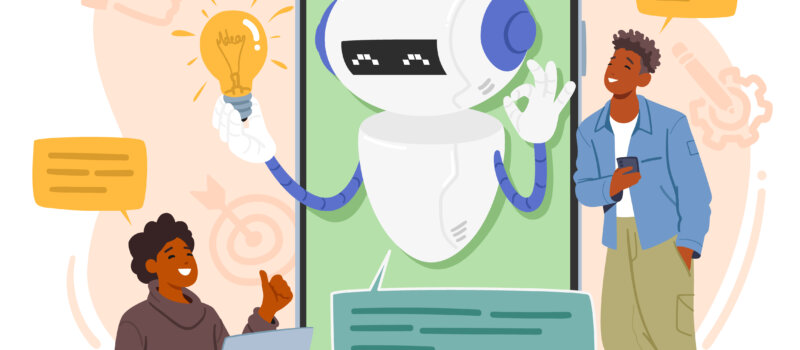An AI virtual assistant is software powered by artificial intelligence that performs tasks, answers questions, and helps users through voice or text interfaces. But it’s not just about answering simple FAQs anymore. Today’s AI virtual assistants use natural language processing and machine learning to carry out more advanced interactions and support a wide range of business functions.
AI virtual assistants are quickly becoming a valuable part of business operations. Let’s break down how they work, what they offer, and how businesses are using them to increase efficiency, cut costs, and provide better service at scale.
Quick Takeaways
- AI virtual assistants use NLP and automation to understand and complete tasks via voice or text.
- Businesses use them to provide 24/7 support, cut costs, and boost productivity.
- They enhance customer experience by offering fast, consistent, and personalized service.
- Common use cases include customer support, sales outreach, HR, and IT helpdesk tasks.
- Choose solutions with strong NLP, integrations, customization, and security features.
How AI Virtual Assistants Work
At the heart of every AI virtual assistant is a mix of natural language processing (NLP), automation, and machine learning. These technologies work together to help the assistant understand human speech or text, interpret intent, and respond with accurate and useful information.
Here’s a simple breakdown of how it works:
- A customer types or says something.
- The assistant processes the input, identifies the intent, and maps it to a relevant response or task.
- It either answers the question, completes an action (like booking a meeting), or routes the request appropriately.
AI virtual assistants improve over time by learning from interactions, adapting responses based on previous behavior, and even detecting tone or urgency in language. They’re also built to integrate with tools like CRM platforms, calendars, contact center software, and more, making them effective across different parts of the business.
Key Business Benefits of AI Virtual Assistants

1. 24/7 Availability Without Additional Staff
Customers expect quick answers, whether it’s 10 AM or 2 AM. With an AI virtual assistant, businesses can offer round-the-clock support without relying on human agents at all hours. These assistants can handle a high volume of inquiries at once, provide self-service options, and ensure no question goes unanswered due to time constraints or staffing issues.
In contact centers, this helps teams avoid backlogs during off-hours or peak times, while giving customers faster access to help.
2. Increased Efficiency and Productivity
AI virtual assistants take repetitive tasks off your team’s plate. That includes things like:
- Scheduling meetings
- Pulling account information
- Resetting passwords
- Updating CRM records
- Collecting customer feedback
By handling these types of tasks, assistants help employees focus on more strategic, creative, or complex responsibilities. It’s especially useful for high-volume departments like customer service, IT support, or HR.
3. Cost Savings at Scale
Hiring, training, and retaining support staff is expensive. AI virtual assistants help reduce that cost by serving as the first line of contact. They scale easily without extra salaries or infrastructure, and can handle a growing workload without sacrificing performance.
Instead of adding more people as your business grows, you can augment your team with smart assistants that automate interactions and workflows.
4. Consistency and Accuracy
Human errors happen, especially under pressure or fatigue. AI virtual assistants offer consistent, pre-trained answers that stay on-brand and up to date. This is important for compliance-heavy industries or businesses with strict communication standards.
And as they learn from new data and interactions, they improve accuracy over time, ensuring users always get the most helpful and relevant responses.
5. Better Customer Experiences
AI virtual assistants shorten wait times, offer quick solutions, and personalize responses based on available data. If a customer has reached out before, the assistant can reference past conversations or purchase history. If a customer’s tone sounds frustrated, the assistant can escalate the issue to a live agent right away.
These small touches make a big difference. Customers feel heard and helped, without having to repeat themselves or wait on hold.
Use Cases Across Departments
AI virtual assistants aren’t limited to one part of the business. They’re showing up in every department that manages communications, requests, or data.

Customer Service
This is the most common use case and for good reason. AI virtual assistants can:
- Handle basic troubleshooting
- Answer FAQs
- Route support tickets to the right agent
- Provide updates on orders or service issues
They act as digital front-line reps, resolving issues quickly and passing along the tough ones with full context to human agents.
Sales
Sales teams use AI virtual assistants to engage leads, book meetings, and qualify opportunities. The assistant can ask a few key questions, log the responses in the CRM, and trigger follow-up actions for the rep to take over.
Some assistants even sync with scheduling tools and send reminders, reducing no-shows and making reps more efficient.
Human Resources
In HR, assistants can support employees with questions about policies, PTO, benefits, or onboarding steps. New hires might interact with a virtual assistant to get their paperwork submitted, book training sessions, or learn about company tools, without needing to email HR for every small task.
IT Helpdesk
IT teams benefit from assistants that can reset passwords, answer system access questions, and guide users through common troubleshooting steps. Instead of opening a ticket for every minor request, users get help in real time, and IT staff have fewer interruptions.
What to Look For in an AI Virtual Assistant
Not all AI virtual assistants offer the same capabilities. When evaluating solutions, look for features that support scalability, security, and customization. Here’s what matters:
- Natural Language Processing (NLP): Make sure it can understand varied inputs, not just keyword triggers.
- Integrations: It should connect to your existing systems (CRM, ticketing software, UCaaS platforms).
- Customization: You’ll want the ability to tailor responses, branding, and workflows.
- Security: Choose solutions that follow industry best practices for data privacy and compliance.
- Analytics: Reporting features help you understand usage trends and optimize performance.
Some businesses also opt for hybrid solutions, where the assistant hands off conversations to a human agent as needed. This ensures smooth transitions and avoids frustration for users who need more detailed help.
Drive Smarter Interactions Today with Intermedia
AI virtual assistants help businesses reduce workload, respond faster, and improve service across departments. They’re not replacing human teams—they’re empowering them. With the right assistant in place, you can streamline operations, scale support, and deliver better experiences without stretching your staff thin.
Whether you’re looking to optimize contact center workflows, improve internal support, or add efficiency to sales outreach, an AI virtual assistant can help you do more with less.
Looking to deliver faster, smarter support across every channel? Discover how Intermedia’s cloud communications and AI-powered solutions can help you build better customer and employee experiences. Request a demo today.
July 25, 2025
Explore other posts on these topics: AI




